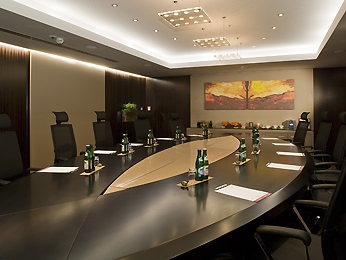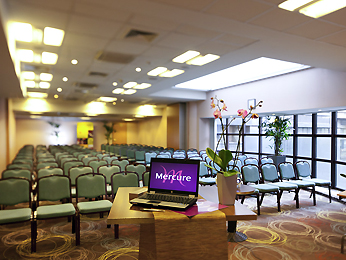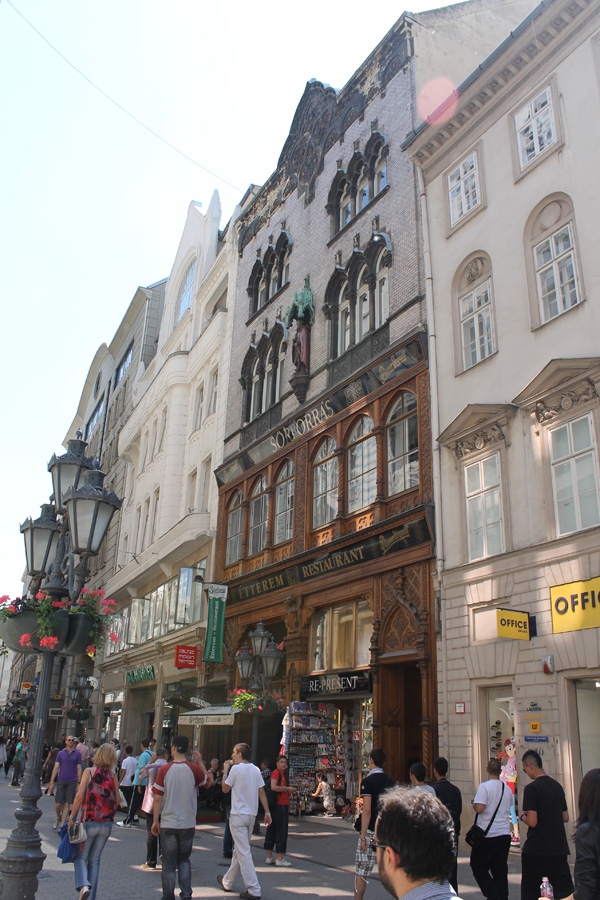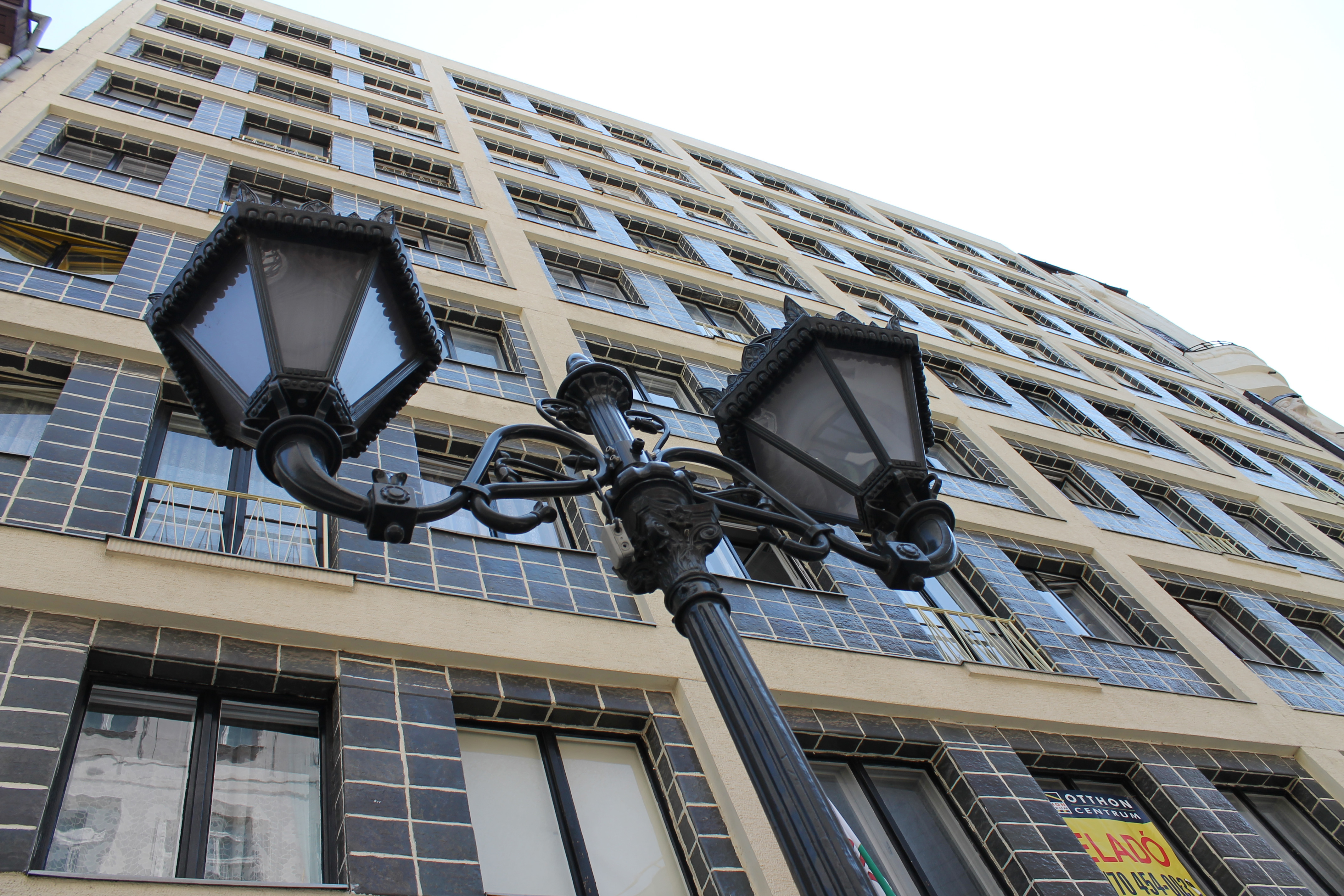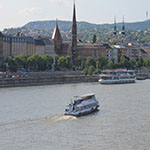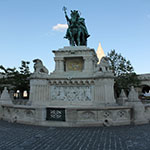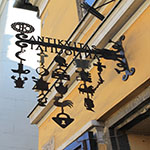Mercure Budapest City Center Hotel
Vaci utca 20 1052 Budapest HungaryConference program
- December 6, 2012
- 12:30 - 13:00Registration (Reception Desk)
- 13:00 - 13:15Welcome and Opening Remarks
- 13:15 - 14:30Keynote Speech – Uwe Puetter (Central European University) Europe’s New Intergovernmentalism and the Role of the European Council
- 14:30 - 15:00Coffee Break & Snack
- 15:00 - 17:00Panel 1 – The Persistence of the Democratic Deficit in the European Union (Chair: Emanuel Crudu)
- 17:00 - 19:00Panel 2 - Toward the Europeanization of Digital Powers: The Role of Digital Technologies in the European Integration (Chair: Xavier Carpentier Tanguy)
- 19:00 - 19:30Welcome Reception (Mercure Budapest City Center - Atrium)
- 19:30 - 21:00Dinner – Restaurant Mercure Budapest City Center
- December 7, 2012
- 09:30 - 10:30Open Floor Workshop – Debating the Politicization of Europe: Past, Present and Future (Chair: Russ Kent, Zuyd University, Maastricht)
- 10:30 - 11:00Coffee Break & Snack
- 11:00 - 13:00Panel 3 – EU’s External Influence: Europeanization, Democratization and Promotion of the Rule of Law
- 13:00 - 14:30Lunch – Restaurant Mercure Budapest City Center
- 14:30 - 16:30Panel 4 – The Future of EU Enlargement
- 16:30 - 17:00Coffee Break & Snack
- 17:00 - 19:00Panel 5 – The Politicization of Europe and the Challenges for Research (Chair: Nevena Dakovic)
- 19:00 - 21:00Optional Social Program
- December 8, 2012
- 09:30 - 11:30Panel 6 - The Eurozone Crisis: Transformative Impact on the European Project and Model(s) of Capitalism (Chair: Davide Bradanini)
- 11:30 - 12:00Coffee Break & Snack
- 12:00 - 13:00Closing Session and Conclusive Discussions
- December 6, 2012
Future Events
 Europe Inside-Out: Europe and Europeanness Exposed to Plural Observers (9th Edition) April 24 - 25, 2020
Europe Inside-Out: Europe and Europeanness Exposed to Plural Observers (9th Edition) April 24 - 25, 2020 Identities and Identifications: Politicized Uses of Collective Identities (9th Edition) June 12 - 13, 2020
Identities and Identifications: Politicized Uses of Collective Identities (9th Edition) June 12 - 13, 2020 8th Forum of Critical Studies: Asking Big Questions Again January 24 - 25, 2020
8th Forum of Critical Studies: Asking Big Questions Again January 24 - 25, 2020 Re-Inventing Eastern Europe (7th Edition) December 13 - 14, 2019
Re-Inventing Eastern Europe (7th Edition) December 13 - 14, 2019 The European Union and the Politicization of Europe (8th Edition) October 25 - 26, 2019
The European Union and the Politicization of Europe (8th Edition) October 25 - 26, 2019
The Second International Conference ‘The European Union and the Politicization of Europe’

- Conference Description
- Participant’s Profile
- Registration and Fee
- Social Activities and Publication
- Important Dates
- Venue and Directions
- Conference Program
- Panel 1
- Panel 2
- Panel 3
- Panel 4
- Panel 5
- Panel 6
The Second Euroacademia International Conference
The European Union and the Politicization of Europe
6-8 December 2012
Mercure Budapest City Center Hotel
Budapest, Hungary
Keynote Speaker: Uwe Puetter, Central European University
The European Union was described by Jacques Delors as an unidentified political object and by Jose Manuel Barroso as the first non-Imperial empire. The descriptors assigned to the European Union are creative and diverse yet the agreement on what is the actual shape that the EU is taking is by no means an easy one to be achieved. Historical choices shaped and reshaped the size and functioning of the EU while the goal of an emerging ‘ever closer union’ is still in search for the paths of real and not ideal accomplishment. The agreement seems to come when it’s about the growing impact of the decisions taken in Brussels on the daily lives of the European citizens and the increasingly redistributive outcomes of the policy choices inside the EU. These dynamics created the framework for the politicization of Europe and opened a vivid debate about the direction and proportions of such a process.
The politicization of Europe takes various shapes and addresses significant puzzles. While it is clear that the EU doesn’t resemble a state it is less clear if the decisions that shape its policies are configured by Pareto efficient outcomes or by dynamics that are intrinsic to a political system and defined by emerging party politics within the European Parliament. The democratic problem or the democratic deficit issue was and continues to be one of the main challenges facing the European Union in any terms or from any position is understood or described. The problem of accountability for the decision making inside the EU was there from the beginning and it emerged gradually as more emphatic on the agenda of vivid debates as the powers of the EU have grown after the Maastricht Treaty. This was concomitant with a growing disenchantment of citizens from member states with politics in general, with debates over the democratic deficits inside member states, with enlargement and with a visible and worrying decrease in voters’ turnouts at both national and especially European elections. The optimist supporters of EU believe in its power to constantly reinvent and reshape while the pessimists see either a persistence of existing problems or a darker scenario that could lead in front of current problems even to the end of the EU as we know it.
The Euroacademia International Conference ‘The European Union and the Politicization of Europe’ aims to survey some of these current debates and addresses once more the challenges of the EU polity in a context of multiple crises that confronted Europe in recent years. It supports a transformative view that involves balanced weights of optimism and pessimism in a belief that the unfold of current events and the way EU deals with delicate problems will put an increased pressure in the future on matters of accountability and will require some institutional adjustments that address democratic requirements for decision making. However in its present shape and context the EU does not look able to deliver soon appropriate answers to democratic demands. In a neo-functionalist slang we can say as an irony that the actual crisis in the EU legitimacy is a ‘spillover’ effect of institutional choices made some time before. To address the EU’s democratic deficit however is not to be a skeptic and ignore the benefits that came with it but to acknowledge the increasing popular dissatisfaction with ‘occult’ office politics and with the way EU tackles daily problems of public concern while the public is more and more affected by decisions taken at the European level.
Is the EU becoming an increasingly politicized entity? Is the on-going politicization of Europe a structured or a messy one? Do political parties within the European Parliament act in a manner that strengthens the view of the EU as an articulate political system? Are there efficient ways for addressing the democratic deficit issue? Can we find usable indicators for detecting an emerging European demos and a European civil society? Does a Europeanization of the masses take place or the EU remains a genuinely elitist project? Did the Lisbon Treaty introduced significant changes regarding the challenges facing the EU? Can we see any robust improvements in the accountability of the EU decision making processes? Are there alternative ways of looking at the politicization processes and redistributive policies inside the EU? These are only few of the large number of questions that unfold when researchers or practitioners look at the EU. It is the aim of the Second Euroacademia International Conference ‘The European Union and the Politicization of Europe’ to address in a constructive manner such questions and to offer o platform for dissemination of research results or puzzles that can contribute to a better understanding of the on-going process of politicization within the European Union.
Participant’s Profile
The conference is addressed to academics, researchers and professionals with a particular interest in Europe and European Union from all parts of the world. As the nature of the conference is intended to be multidisciplinary in nature different academic backgrounds are welcomed.
Post-graduate students, doctoral candidates and young researchers are welcomed to submit an abstract. Representatives of INGOs, NGOs, Think Tanks and activists willing to present their work with impact on or influenced by specific understandings of the European Union are welcomed as well to submit the abstract of their contribution.
Abstracts will be reviewed and the participants are selected based on the proven quality of the abstract. The submitted paper for the conference proceedings is expected to be in accordance with the lines provided in the submitted abstract.
Registration is now closed
The participation fee includes:
- the registration fee,
- all the materials for the conference
- a copy of the electronic volume
- access to Euroacademia discussion group and newsletters
- discounted rates for participation in the future Euroacademia conferences
- coffee brakes with snacks and fruits for all the duration of the conference
- wine reception and a cocktail with buffet dinner for 6 December 2012 at the 4* Mercure Budapest City Center Restaurant
- a 3 course lunch on 7th of December 2012 at the 4* Mercure Budapest City Center Restaurant
- certificate of attendance
- optional social program.
A registration form will be sent to accepted participants that must be filled in and sent to [email protected] until 25th of October 2012 and until the 30th of October the payment of the participation fee through bank transfer is requested and considered as the final confirmation of attendance. No paper will be introduced in the program without confirmation and payment of the participant fee.
Please be aware that the final confirmation of attendance will be considered upon payment of the participation fee in the Euroacademia account:
Euroacademia
Credit Mutuel
IBAN: FR7610278060470002073210155
BIC: CMCIFR2A
PARIS 17 ETOILE, 30 AVENUE NIEL 75017 PARIS FRANCE
The participation fee can be paid only through bank transfer. A confirmation of receipt with the scanned invoice will be sent to you by e-mail and the original invoice will be delivered to you on site at the conference.
Few partial participation fee waivers will be available on a competitive basis for participants with limited financial support from their institutions of affiliation based on proven need.
Unfortunately, Euroacademia has no available funds for covering transport and accommodation in Budapest. Participants are responsible for finding funding to cover transportation and accommodation costs during the whole period of the conference. Official letters can be sent by Euroacademia to the financing institution to confirm the selection and participation in the conference upon request.
Social Activities and Publication
A specific spot in the conference program will be dedicated to social networking and therefore all the participants interested in setting or developing further cooperation agendas and prospects with other participants will have time to present and/or promote their project and express calls for cooperation.
A specific setting (Social Corner) for promotional materials connected with the topic of the conference will be reserved for the use of the participants. Books authored or edited by the participants can be exhibited and promoted during the whole period of the conference and can also be presented within the conference package based on prior arrangements.
An optional dinner and a social event will be organized for the second evening of the conference on a boat on the Danube river as optional program for the willing participants. The social dinner will be held based on participant’s confirmation and its costs are to be covered by the participants.
Publication:
Selected papers will be published in an electronic volume with ISBN after the confirmation of the authors and a double peer-review process based on an agreed publication schedule. All the papers selected for publication should be original and must have not been priory published elsewhere. All participants to the conference will receive a copy of the volume.
| Important Dates | |
|---|---|
| 25th of September 2012 | Deadline for Submitting Panel Proposals |
| 15 October 2012 | 300 words abstracts and details of affiliation |
| 20th of October 2012 | Notification of acceptance |
| 25th of October 2012 | Sending the participation form |
| 30 October 2012 | Payment of the conference fee |
| 20th of November 2012 | Sending the draft paper to be uploaded on the web site of the conference |
| 25th of November 2012 | Publication of the conference program and uploading the draft papers on the website |
| 6 December 2012 | The conference commences |
Venue and Directions
The conference will take place in the conference premises of the exclusive 4 stars Mercure Budapest City Center Hotel, centrally located in the heart of Budapest on the famous Vaci Utca, easily accessible from within the historic center and within a walking distance from all the major tourist attractions: just few steps away from the River Danube, main museums and the most attractive sights of Budapest.
Mercure Budapest City Center Hotel
Vaci utca 20
1052 BUDAPEST
HUNGARY
Tel.: (+36)1/4853100
Fax: (+36)1/4853111
E-mail: [email protected]
Budapest is a wonderful Central European city on the River Danube with a very rich history and a vivid passionate intellectual life; a place full of various and inspiring cultural events, sightseeing opportunities, great food and exquisite architecture. The unique atmosphere gives anyone a chance for personal memories and reveries. Budapest is a city of beautiful moments!
See full information about the conference Location & Map:
HERE
Conference participants are responsible for arranging the accommodation and travel. However, discounted rates upon request for reservations for the selected participants at the conference are offered by Mercure Budapest City Center Hotel.
The Persistence of the Democratic Deficit in the European Union
(Chair Emanuel Crudu, IMT Institute for Advanced Studies, Italy)
- The German Intellectual Debate about the “Finalité” of European Reformation. A Noteworthy Rejection of a European Federal “Nation State”For some months, a vivid intellectual debate takes place in the German press about the “finalité” of on-going European reformation. Its participants aim to widen the focus for a longer perspective. They seem to share the impression that the actual decision-making in European politics is lacking such an idea of the future of Europe and is driven by one wave of the unfolding crisis after another. Despite many fundamental controversies among them, almost all reject quite naturally the outlook of a European federal “nation state”.Manuel Franzmann, Goethe-University, Frankfurt/Main, Germany
- Counteracting Democratic Deficit in the European Union through a New Multilevel “Trial” Model of DemocracyThe paper will examine, by which alternative models the democratic legitimacy of the European Union can be ensured in the long period and how a more efficient and regular cooperation can be designed and promoted in particular between the European Parliament and national parliaments, national parliaments among themselves, and between national and sub-national parliaments. I will especially analyze, whether the democratic deficit can be counteracted by the fact, that Member States’ parliaments are stronger integrated into the legislative process of the European Union. However, this raises the question whether the newly created role of national parliaments under the article 12 TEU can be qualified as a independent legislative role of national parliaments in the legislative process of the Union which brings a new three-stage "trial" model of democracy "Hüseyin Celik, Research Fellow at the University of Zürich and University of Neuchatel; Visiting Research Fellow at the Humboldt-University of Berlin
- Empowerment of National Parliaments and the European Democratic DisconnectBy looking at the role of parliaments in the relation between executive and people, I give evidences of how the role of national parliaments could be crucial for two reasons. Firstly, they have now the potential for becoming the channel for the establishment of a constitutive dialogue between the national and the European level and secondly they can contribute to enhancing citizens’ engagement in EU affairs.Maria Romaniello, IMT institute for Advanced Studies, Lucca, Italy
- Democratic Deficit of the EU After the Lisbon Treaty – Is There an Institutional Solution?The paper addresses two main issues. First one refers to the elements of the standard version of the democratic deficit and whether they have been properly addressed and solved by the Lisbon Treaty. The second issue that is elaborated is the issue of European identity, as a source of legitimization of a political community. There is a persistent absence of an awareness of or identification with the European Union as a political community by the citizens. This paper will provide possible scenarios for further development in this respect.Hristina Runceva, Law Faculty Iustinianus Primus, Skopje, Republic of MacedoniaMilena Apostolovska, Law Faculty Iustinianus Primus, Skopje, Republic of Macedonia
Toward the Europeanization of Digital Powers: The Role of Digital Technologies in the European Integration
(Chair Xavier Carpentier-Tanguy, Centre Virtuel de la Connaissance sur l’Europe, Luxembourg)
- Introductory Speech: Toward the Europeanization of Digital Powers – The Role of Digital Technologies in the European IntegrationIn a period of communication and globalization, the European Union has been suffering the most daring challenges. New elements are continuously emerging. The new digital powers are some among others. Internet activism, online organization, blogosphere, e-petitions, corporate activism are some of its tools. Individuals, groups, lobbies acting at the European level have to be seen as new cultural encounters designing new perspectives of sharing ideas, values and norms. This panel aims to focus on such facilitators with a specific focus on those claiming for a new culture and new political type of activities trough and with digital activism.Xavier Carpentier-Tanguy, Centre Virtuel de la Connaissance sur l’Europe, Luxembourg
- The Role of the Euroblogosphere in a Context of a EPSThis study aims to illuminate the perception of Spanish and English language bloggers and to understand them and their activities from the analytic perspective of an online European Public Sphere (EPS). The research, using a methodology of semi structured online interviews, answers two questions. The first one how these bloggers give evidence of an actor-based online European transnational blogosphere. And the second what, based on the interviews, do they perceive to be the key attributes of the EPS, including its majors strengths and problems.The findings give evidence of what is it the role of the Euroblogosphere in the online EPS, and its contribution of more democratic debate.Javier Ruiz Soler, Lund University, Sweden
- Unpuzzling Policies"Puzzled by Policy?" (PbP) is a 3-year e-democracy pilot action project launched Sep-2010, funded by the Competitiveness and Innovation Framework Programme. PbP has taken up the challenge to reconnect a disillusioned society to policy making by informing, consulting and empowering citizens at both national and European level, focusing on migration policies at four pilot sites: Athens, Turin, the Canary Islands, and Hungary. PbP builds on preexisting web technologies. Its web portal involves (1) Policy Profiler, a quiz positioning users between liberal and conservative attitudes to immigration,Takacs Gyula Peter, National Infocommunication Service Company Ltd., Budapest, Hungary
- The Role of Digital Technologies in Europe: The Case of Audiovisual CultureWe established that Europe insists in considering digital cinema in terms of digital distribution of feature films in cinema theaters. Local public financing bodies tend to not even consider the works, if they are not meant to be distributed within traditional structures of cinema theaters or television. Understanding of technology as an impartial and ideologically neutral means prevails, enabling the preservation of traditional workflows and old power structures, while financing of celluloid film production is ideologically masked as the preservation of high (celluloid) culture. The paper will address the question, if such results indeed confirm Stiegler's reproaches, and if so, what is to be done to overcome such situation.Melita Zajc, Institute for Media Communication, University of Maribor
EU’s External Influence: Europeanization, Democratization and Promotion of the Rule of Law
- A Panacea for All Ills? The European Rule of Law Promotion and the Role of EULEX in the State-Building Process in KosovoThrough an agent-oriented approach, the paper attempts at presenting Kosovo’s state-building transition as a case which tests the European Union’s strategy of rule of law promotion abroad. Holding that new weak states are subject to variably dense external linkages and pressures which influence the domestic conditions for democracy, I pursue the argument that the establishment of the rule of law in Kosovo is currently undermined by the European top-down state-building process.Lorena Pullumbi, IMT Institute for Advanced Studies Lucca, Italy
- Defining the EU Mission in KosovoThis paper focuses on the dimensions of coherence of EULEX aiming to identify its profile within the ESDP framework, by examining its internal and external coherence. In terms of vertical coherence, the paper will explore the Mission as conceptualized and ‘incepted’ in Brussels, in comparison with its actual deployed form on the ground in Kosovo. In terms of horizontal coherence, the paper engages in a comparative analysis between, the discourse of EULEX and its action, on one hand and deliberating the multiple identities of the Mission, which transcend the traditional security concept, on the other. From the theoretical perspective, the paper brings together theories of security studies to analyze EULEX’s action on the ground and discourse theories used in political science to analyze the text and speech of the Mission.Vjosa Musliu, Gent University, BelgiumShkendije Geci, The National University of Public Services - Doctoral School of Military Science in Budapest, Hungary
- The Impact of the European Model in State-Building Promotion: The Western Balkans and the Albanian Case In the EU Integration ProcessAbstract: The European Union remains the main actor to step up for significant efforts to achieve a successful democracy building in the Western Balkans. The main aim of this study is to analyze the impact of the EU model and approach to achieve a democratic state-building through promoting political reforms in the Western Balkans. However, the study will analyze the path of the Western Balkan countries on their state-building processes and the EU's impact on the effective implementation of institutional reforms, on political and economic change in the countries of Western Balkans. The paperIrna Peshkepia, International Relations Department, ‘Kristal” University, Tirana Albania
The Future of EU Enlargement
(Chair Emanuel Crudu, IMT Institute for Advanced Studies, Italy)
- The Future of the European Union Enlargement and Its ChallengesThis paper attempts to examine some of the key contemporary challenges confronting the European Union, and to explain how they are challenging for the EU while paying a close attention to the possible solutions to the problems. The aim of this paper is analyzing the following challenges: The first issue is the future shape of enlargement of the EU. The second structural challenge is democratic deficit that has often been described as the distance between the EU institutions and citizens. The third challenge is dealing with sovereign defaults which we can examine the case of Greece and the future of euro. The final challenge is foreign policy dilemma.Habibollah Abolhassan Shirazi, Tehran Azad University, Iran
- EU Enlargement in the Hungarian PerspectiveIn the new Hungarian Security Strategy adopted in February 2012, it is clearly stated, that Hungary wants all of its neighboring states to become a full member of the EU as soon as possible (and, with extension, would like to see the Western Balkans states in the EU as well.) From these assumptions, my paper analyzes the Hungarian perspectives, interests and goals in the Enlargement process and shows that Budapest is an important, albeit often neglected motor of the European integration in this regard.András Hettyey, The Danube Institute, Budapest, Hungary
- EU Perspectives Between Politics, Economics and Ethnicity: Are There Lessons To Be Learned From The Cases of Former Yugoslavia and B&H?The USA has become first a political union and consequently a monetary union. Former Yugoslavia used to be a political and monetary union. B&H is a sort of monetary union, and likewise the EU, B&H is not a political union. Yugoslavia has got disintegrated. B&H is on the verge either of disintegration or eventually integration. In this paper I try to draw some lessons from both former Yugoslavia and B&H past that might be useful to be considered in the context of the EU's future.Dragoljub Stojanov, University of Rijeka, Croatia
- Assessing the Convergence After EnlargementThe argument in the current literature goes that through the enlargement strategy, the EU determined the convergence for the new members both in terms of substantive democratization as also in terms of attachment to western democratic values as community making factors. The present study aims to assess such claims in the current post-enlargement environment. While most of the convergence arguments were built within the literature before the effective enlargement took place, there was no post-enlargement follow up yet many assumptions regarding the expected convergence as political dynamic entered the common usage and are now taken for granted.Emanuel Crudu, IMT Insititute for Advanced Studies
The Politicization of Europe and the Challenges for Research
- The Governmentalities of Cultural Policy in Europe: The Actors, Discourses and FormulationsThe COE, UNESCO, and the EU have become the key players affecting cultural policy discourses, practices, and actions in Europe. While national cultural policies both affirms and translates the principles and values of cultural policy in Europe, cultural policy-making/discourses is inextricably interwoven with the policies of these transnational institutions. Hence, while this paper examines how cultural policy discourses and practices are governed and mobilized by these symbolically, legally and politically powerful European institutions, the very concepts of democracy, citizenship, and foreignness are interrogated within the context of politicization of cultural policies.Zulal Fazlioglu Akin, Ohio State University, USA
- Defining the European Union’s Final BordersThe EU has progressively extended its zone of peace and democracy across the European continent through successive enlargement rounds. But while values, above all, define the borders of Europe, geographical determinants still matter. One solution could be that since the EU is a political project, its borders should also be political. In other words, which countries are allowed to join the EU should be determined by whether they share a common vision with the existing members. Since the EU Treaty gives any European country the right to apply for Union membership, any attempt to draw a final boundary around its territory would not be consistent with the Treaty. But the question of the Union’s final borders must be addressed as it is closely related to two vital issues, the EU’s integration capacity and the EU’s future. Eventually…"somewhere we have to stop".Maria Lagkadinou, Lancaster University, UK
- Fragmentation and Fusion inside European StudiesThe aim of this paper is to map out the impact of the crises of Europe on the restructuring of the European Studies. I would like to claim that the crises manifested also as the increasing threat of EU fragmentation or break-up is paralleled by the similar de- and re-construction of the European Studies. Initially defined - in number of documents of the Council of Europe-as inter and transdisciplinary by nature; concerned with supranational, intergovernmental and transnational; outlined as “comparative study of the historical, political, economic, legal, social, intellectual and cultural development of European societies” ES are now in transformation according to vested changing concepts of Europe.Nevena Dakovic, University of Belgrade, Serbia
- Use of Scientific Evidence in EU Policy-Making: Better Accountability for EU Decision-Making?It was often argued in the past that lessons offered by policy evaluations rarely had a real impact on subsequent policy-decisions in the EU and elsewhere. However, important changes are taking place that influence the nature of EU decision-making.The Better Regulation agenda (launched in 2002) threw new light on policy-assessment research, and it is now the stated aim of the European Commission to better utilise programme evaluation and impact assessment results in policy-making.Edina Ocsko, Central European University
The Eurozone Crisis: Transformative Impact on the European Project and Model(s) of Capitalism
(Chair Davide Bradanini, IMT Institute for Advanced Studies, Italy)
- The Prospect of a European Federation. How the Euro Crisis is Pushing the EU towards FederalismThe current crisis, made federalism an unavoidable milestone for the future of Europe. Nevertheless, the main debate of the coming years will be centered on the nature of this federalism. Will one vision prevail over the other, or eventually a combination of different types will shape the European Union for the next century. The aim of this paper is to outline the major federalist projects that are proposed today in the EU and which one is most likely to materialize. It will also deal with the role of the single currency, the restructuring of EU institutions, and the place its founding values will have in the sui-generis construction of a transnational federation.Marius Mitrache, Universite Paris-Est, Paris, France
- Securitizing the Euro? Crisis Rhetoric between Silence and DramatizationIn 2011, the euro debt crisis intensified on a rapid scale. Numerous emergency measures were adopted in order to maintain stability and to avoid a collapse of the single currency. Among these measures were ad-hoc EU summit decisions and rescue packages, unprecedented actions by the European Central Bank (ECB) to ease government bond interest rates of indebted crisis states, the disempowerment of parliaments, austerity programs and fiscal surveillance measures. This paper strives to explore how the above named emergency measures could be adopted so quickly and how they were justified by EU- and national actors.Robin Lucke, University of Passau, Germany
- Politicization, Issue Salience and the Consumer Policy Output of the European CommissionIn empirical terms, the paper focuses on European consumer policy. Based on novel politicisation and salience indicators and an analysis of regulatory proposals between 1999 and 2008, it shows that the Commission alters its consumer policies to the advantage of the diffuse mass of European consumers when high levels of politicisation and issue salience meet.Christian Rauh, Social Science Research Center Berlin (WZB)
- The Eurozone Crisis: Transformative Impact on the European Project and Model(s) of CapitalismAbstract: Europe in these days appears to move from one ‘crisis’ to the next. The deep and apparently perennial crisis of the Eurozone has been on the headlines for a couple of years now, and shows signs of a further exacerbation. The crisis raises several issues of interest for students of political science, political economy and international relations. What appears clear is that the problems of the Eurozone are signals of a weakening (if not an outright failure) of European integration as it was envisaged starting from the early 1990s. The political and cultural dimensions of the crisis ofDavide Bradanini, IMT Institute for Advanced Studies Lucca, Italy














